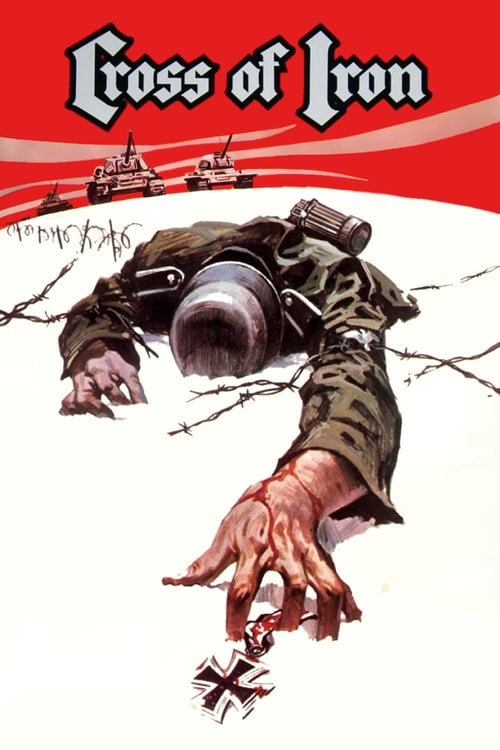
Cross of Iron
Released: 1977-01-29
It is 1943, and the German army—ravaged and demoralised—is hastily retreating from the Russian front. In the midst of the madness, conflict brews between the aristocratic yet ultimately pusillanimous Captain Stransky and the courageous Corporal Steiner. Stransky is the only man who believes that the Third Reich is still vastly superior to the Russian army. However, within his pompous persona lies a quivering coward who longs for the Iron Cross so that he can return to Berlin a hero. Steiner, on the other hand is cynical, defiantly non-conformist and more concerned with the safety of his own men rather than the horde of military decorations offered to him by his superiors.
Drama
Action
History
War
7.1 / 413
Duration: 132 min.
Budget: $6.0M
Revenue: $1.5M
Trailer
Gallery
Reviews

John Chard
Rating:9/10
War is Peckinpah's survival hell. Out on the Eastern Front 1943, battered by the war itself, a war they are losing, a platoon of German soldiers must also cope with a new aristocratic commander who deeply covets the Cross Of Iron, Germany's highest medal of honour. Universally hated and panned by the critics upon release, Cross Of Iron now stands up as one of director Sam Peckinpah's finest works. On first glance it would seem to have been a strange film (genre) for Peckinpah to tackle, but scratch away at the scabs left by Peckinpah's trademark violence, and you see underneath that it sits comfortably with his character driven Western fables. Adapting from the much lauded novel by Willi Heinrich, Peckinpah is bleakly telling of men in combat, men who are not here for heroics, they are merely trying to survive, the realities of war draining their last bit of strength by the day. Then it's at the mid point when you realise that Peckinpah (possibly chuckling away into his stein of beer) has neatly led us into sympathy for the enemy of the good old war film, the German soldier. All cloaked by death dealer Peckinpah himself, with slow-mo blood baths and poetic like harshness emphasising the story unfolding. Men, true to the director's form, are defined by what they do above all else, regardless of the consequences. Men perfectly portrayed by James Coburn (never better) as Feldwebel Rolf Steiner and Maximilian Schell as Hauptmann Stransky, giving us men from different spectrum's who have differing ideals in life. Also evident is a classic Peckinpah theme of establishment superiors trying to stamp down on the "real" men, the irony of such being that this was yet another Peckinpah film beset with interference outside of his control. Cut and tampered with, it's only now that we can see Pekinpah's actual uncut version of the film - so accept nothing that runs under 130 minutes on Home Formats. From the opening montage of WWII footage, played out as German children sing a haunting little ditty, to the climatic, almost surreal finale as Coburn maniacally laughs into the end credits (be sure to watch these to the end for Bertolt Brecht's bitter quote closure), this is no ordinary war film. It's all shot expertly by cinematographer John Coquillon. So with the ugly themes of moral corruption and the shattering of youthful innocence, this is one unpleasant, even insane picture. In short, Cross Of Iron "is", as Orson Welles was known to say, one of the greatest anti-war films ever made. 9/10
Hover to reveal

Wuchak
Rating:7/10
**_Brutal Germans vs. Russians WW2 flick with James Coburn and Maximilian Schell_** As defeat looms on the Eastern Front, an awarded, but battle-worn German NCO (Coburn) vies with a newly-appointed captain, a Prussian aristocrat, who’s obsessed with obtaining the Iron Cross (Schell), even if he has to get it by fraud. James Mason and David Warner have peripheral roles. Loosely based on the true story of Johann Schwerdfeger, “Cross of Iron” (1977) was helmed by Sam Peckinpah and, therefore, is unsurprisingly filled with bloody carnage (much of it in slow-motion), alcohol-consumption and a generally pessimistic view of life. As typical, the protagonist is a loner who desires to be honorable but is forced to do whatever is necessary to survive in a world of nihilism and brutality. Some might complain that Coburn was 48 playing a man who was 28 at the time of the events. Yet producers were naturally more interested in a big-name actor with the charisma to fill seats at the cinema than they were in being technically accurate. And, honestly, Coburn’s performance is one of the top attractions. As far as I know, this was the first major film released in North America to be set on the Eastern Front. Since the protagonists were Germans it’s no surprise that it didn’t do well in the US and Canada, but it was successful in Europe and has developed a strong cult following. The core story needed to be better elucidated, but if you use the subtitles it isn’t too difficult to figure out. People complain about the disorienting combat sequences (right out of the gate), which is valid, but they successfully depict how modern combat is experienced by those in the field. Despite the film’s issues, there are several highlights, including the great action, the palpable tension between Steiner and Stransky, Coburn and Schell’s performances, the bleak reflections on life and the late sequence involving a female Russian detachment. But why does Steiner hate ALL officers, which strikes me as unconvincing? What's he expect, that there be NO ONE in charge of strategic military operations? If someone respects & supports you, like Col. Brandt does with Steiner, you should appreciate it. I think it comes down to how battle-weary Steiner was, not to mention he didn't even believe in the Nazi-led cause of Germany. I also believe it's a matter of Steiner being a sigma male while officers are typically alpha males. The movie runs 2 hours, 7 minutes, was shot in Trieste in northeastern Italy and Obrov in Slovenia, as well as Zagreb and Savudrija in Croatia. Interiors were done at Pinewood Studios outside London, to the west. GRADE: B/B+
Hover to reveal

CinemaSerf
Rating:7/10
The aristocratic "Capt. Stransky" (Maximilian Schell) is put in charge of an accomplished squadron of men that works well under its no-nonsense "Sgt. Steiner" (James Coburn), and into battle against the approaching Soviets they go. A bloody encounter ensues and upon their return, victorious to a point, to their trenches he encourages "Col. Brandt" (James Mason) to nominate him for an Iron Cross. He cites two officers as the witnesses to his bravery, but "Steiner" decides not to play ball. "Stransky" is livid, but plays a long game that ends up seeing the squad left unaware of marching orders and left adrift in the face of an enemy with overwhelming superiority. "Steiner" must now galvanise his already exhausted and demoralised soldiers and try to work their way through increasingly hostile territory to make it back to their own lines. Sam Peckinpah uses the Soviets as his foe here so that avoids any unpatriotic accusations back home, and allows him to deliver a gritty and authentic looking wartime drama that focusses way more on the human beings involved. Their flaws and their strengths are illustrated as each is tested to his own individual breaking point - all whilst shells and bullets fall around them. Coburn was a master of the less-is-more style - his demeanour and facial expressions did most of his acting for him, and there's also a strong contribution from David Warner as the battle-weary "Kiesel". James Mason, I felt, wasn't quite a natural here but in the end it all comes down to a battle of wills between the entitled "Stransky" and the experienced "Steiner" who lock horns effectively. The production and photography really capture well the degradation in which these soldiers - and the locals they encounter along the way - lived their lives. In muddy squalor with little food and and some almost animalistic instincts at times, too. It's also an entirely plausible nail in the coffin of the last vestiges (as was the case in the Great War) of command being vested in the upper classes who cared little for anything but the plaudits of laurel leaves and faux bravery.
Hover to reveal